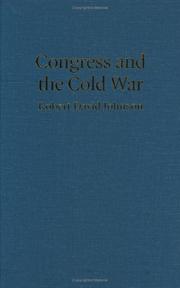| Listing 1 - 10 of 49 | << page >> |
Sort by
|
Book
ISBN: 1536114391 Year: 2010 Publisher: New York, [New York] : Nova Science Publishers, Inc.,
Abstract | Keywords | Export | Availability | Bookmark
 Loading...
Loading...Choose an application
- Reference Manager
- EndNote
- RefWorks (Direct export to RefWorks)
Periodical
Year: 1995 Publisher: Washington, D.C. : U.S. General Accounting Office,
Abstract | Keywords | Export | Availability | Bookmark
 Loading...
Loading...Choose an application
- Reference Manager
- EndNote
- RefWorks (Direct export to RefWorks)
Book
ISBN: 1614701008 9781614701002 1607413213 9781607413219 Year: 2010 Publisher: New York
Abstract | Keywords | Export | Availability | Bookmark
 Loading...
Loading...Choose an application
- Reference Manager
- EndNote
- RefWorks (Direct export to RefWorks)
Intelligence service --- Legislative oversight --- Disclosure of information --- Congressional oversight --- Oversight, Congressional
Book
ISBN: 1536114960 Year: 2011 Publisher: New York : Nova Science Publishers, Inc.,
Abstract | Keywords | Export | Availability | Bookmark
 Loading...
Loading...Choose an application
- Reference Manager
- EndNote
- RefWorks (Direct export to RefWorks)
Intelligence service --- Legislative oversight --- United States.
Book
ISBN: 1536116149 Year: 2011 Publisher: New York : Nova Science Publishers, Inc.,
Abstract | Keywords | Export | Availability | Bookmark
 Loading...
Loading...Choose an application
- Reference Manager
- EndNote
- RefWorks (Direct export to RefWorks)
Legislative oversight --- United States --- Officials and employees --- Selection and appointment.
Book
ISBN: 1634851587 9781634851589 9781634851572 Year: 2016 Publisher: New York
Abstract | Keywords | Export | Availability | Bookmark
 Loading...
Loading...Choose an application
- Reference Manager
- EndNote
- RefWorks (Direct export to RefWorks)
Legislative oversight --- Administrative agencies --- Administrative acts --- Administrative procedure
Book
ISBN: 0190206470 9780190206451 0190206454 9780190206475 9780190206444 0190206446 0190206462 Year: 2014 Publisher: New York : Oxford University Press,
Abstract | Keywords | Export | Availability | Bookmark
 Loading...
Loading...Choose an application
- Reference Manager
- EndNote
- RefWorks (Direct export to RefWorks)
Why has U.S. national security policy scarcely changed from the Bush to the Obama administration? And why does it matter? The theory of 'double government' posed by the 19th century English scholar Walter Bagehot suggests a disquieting answer. The public is encouraged to believe that the presidency, Congress, and the courts make security policy. That belief sustains these institutions' legitimacy. Yet their authority is largely illusory. National security policy is made, instead, by a 'Trumanite network' of several hundred members that is largely concealed from public view.
National security --- Legislative oversight --- Judicial review --- Government accountability --- Management. --- Decision making. --- Accountability in government --- Public administration --- Responsibility --- Congressional oversight --- Oversight, Congressional --- National security policy --- NSP (National security policy) --- Security policy, National --- Economic policy --- International relations --- Military policy --- Government policy
Book
ISBN: 1608764974 9781608764976 9781606922132 1606922130 9781606921807 9781608766819 Year: 2009 Publisher: New York Nova Science Pub.
Abstract | Keywords | Export | Availability | Bookmark
 Loading...
Loading...Choose an application
- Reference Manager
- EndNote
- RefWorks (Direct export to RefWorks)
Intelligence service -- United States -- History. --- Legislative oversight -- United States -- History. --- United States. -- Central Intelligence Agency -- History. --- United States. -- Congress. --- Intelligence service --- Legislative oversight --- History --- United States. --- History.
Book
ISBN: 161324195X 9781613241950 9781606927229 1606927221 Year: 2009 Publisher: Hauppauge, N.Y. Lancaster Nova Science Gazelle [distributor]
Abstract | Keywords | Export | Availability | Bookmark
 Loading...
Loading...Choose an application
- Reference Manager
- EndNote
- RefWorks (Direct export to RefWorks)
Legislative power --- Legislative oversight --- History. --- United States. --- Voting --- United States --- Armed Forces

ISBN: 0521528852 9780521528856 0521821339 9780521821339 9780511610707 0511136978 9780511136979 0511134274 9780511134272 051161070X 1107145635 9781107145634 1280308877 9781280308871 0511201192 9780511201196 0511134789 9780511134784 051131146X Year: 2006 Publisher: New York: Cambridge university press,
Abstract | Keywords | Export | Availability | Bookmark
 Loading...
Loading...Choose an application
- Reference Manager
- EndNote
- RefWorks (Direct export to RefWorks)
The first historical interpretation of the congressional response to the entire Cold War. Using a wide variety of sources, including several manuscript collections opened specifically for this study, the book challenges the popular and scholarly image of a weak Cold War Congress, in which the unbalanced relationship between the legislative and executive branches culminated in the escalation of the U.S. commitment in Vietnam, which in turn paved the way for a congressional resurgence best symbolized by the passage of the War Powers Act in 1973. Instead, understanding the congressional response to the Cold War requires a more flexible conception of the congressional role in foreign policy, focused on three facets of legislative power: the use of spending measures; the internal workings of a Congress increasingly dominated by subcommittees; and the ability of individual legislators to affect foreign affairs by changing the way that policymakers and the public considered international questions.
Cold War --- Guerre froide --- Koude oorlog --- Oorlog [Koude ] --- Legislative oversight --- History --- United States. --- United States --- Foreign relations --- 1945-1989 --- United States. Congress --- 20th century --- Cold War. --- Oversight, Legislative --- Legislative power --- Separation of powers --- World politics --- Legislative oversight - United States - History - 20th century --- United States - Foreign relations - 1945-1989 --- Arts and Humanities
| Listing 1 - 10 of 49 | << page >> |
Sort by
|

 Search
Search Feedback
Feedback About UniCat
About UniCat  Help
Help News
News